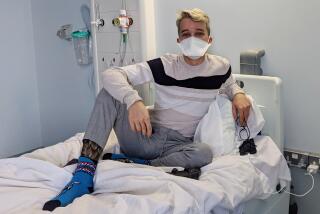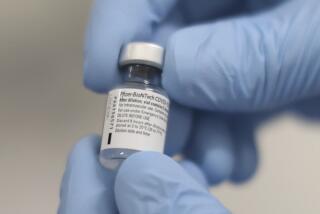Oxford and AstraZeneca to resume coronavirus vaccine trial

- Share via
LONDON — Oxford University says trials of a coronavirus vaccine it is developing with pharmaceutical company AstraZeneca will resume, days after being paused because of a reported side effect in a patient in the U.K.
In a statement, the university said that in large trials “it is expected that some participants will become unwell and every case must be carefully evaluated to ensure careful assessment of safety.”
It said that globally some 18,000 people have received the vaccine as part of the trial.
Though it would not disclose information about the patient’s illness, an AstraZeneca spokesman said this week that a woman had developed severe neurological symptoms that prompted the pause in testing.
The university insisted that it is “committed to the safety of our participants and the highest standards of conduct in our studies and will continue to monitor safety closely.”
Pauses in drug trials are commonplace.
The study had been previously stopped in July for several days after a participant who got the vaccine developed neurological symptoms; it turned out to be an undiagnosed case of multiple sclerosis that was unrelated to the vaccine, researchers said.
Late last month, AstraZeneca began recruiting 30,000 people in the U.S. for its largest study of the vaccine. It also is testing the vaccine in thousands of people in Britain and in smaller studies in Brazil and South Africa. Several other COVID-19 vaccine candidates are in development.
Dr. Soumya Swaminathan, the World Health Organization’s chief scientist, said the U.N. health agency wasn’t overly concerned by the pause in the Oxford and AstraZeneca vaccine trial, describing it as “a wake-up call” to the global community about the inevitable ups and downs of medical research.
More to Read
Sign up for Essential California
The most important California stories and recommendations in your inbox every morning.
You may occasionally receive promotional content from the Los Angeles Times.










